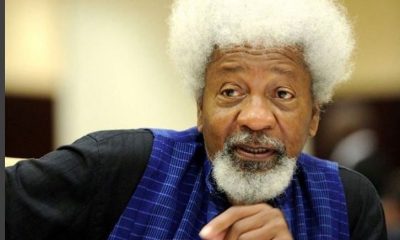
Life style
Wole Soyinka Unveils Profound Connection to Orisa Worship

iexclusivenews – Nobel Laureate Professor Wole Soyinka, in a revealing interview with CNN’s Larry Madowo, has opened up about his spiritual inclinations, expressing a profound connection to Orisa worship.
The renowned Nigerian author and playwright, known for his critical stance on various social and political issues, shared insights into his religious preferences, shedding light on the depths of his spiritual journey.

Wole Soyinka Embraces Orisa Worship A Journey of Creativity and Mystery
Soyinka, a towering figure in African literature, explained that his preference for Orisa worship stems from its fascinating attributes that resonate deeply with his artistic sensibilities.
The Nobel Laureate’s revelation offers a unique perspective on the intersection of traditional African spirituality and contemporary thought, challenging conventional religious narratives.
“I was fortunate to be born in two worlds – the Christian world and traditional Orisa worshippers,” Wole Soyinka began, setting the stage for his compelling narrative. He went on to describe how his grandfather, a chief and Orisa adherent before conversion to Christianity, played a significant role in exposing him to this traditional belief system.

| RELATED NEWS: |
| Wole Soyinka Opens Up On Atiku and Tinubu |
| #EndBadGovernance: Soyinka Slams Tinubu for Ignoring Brutal Protest Crackdown |
The Allure of Orisa Worship
The allure of Orisa worship, according to Soyinka, lies in its artistic and creative elements, coupled with an air of mystery that he finds lacking in Christianity and Islam.
“For me, it (Orisa worshipping) was more artistic, creative, and also more mysterious. I don’t find much of the mysterious in Christianity and even less in Islam,” he explained, attributing his limited exposure to Islamic environments as a factor in this perception.
Soyinka’s words paint a picture of Orisa worship as an open and ecumenical faith system, characterized by a spirit of generosity. This openness, he suggests, allowed for the penetration and sometimes distortion of Orisa beliefs by foreign religions.
However, he emphasizes a crucial aspect of Orisa worship that sets it apart: its non-violent nature. “It is one of those African religions which eschew violence,” Soyinka stated, highlighting a core value that aligns with his own philosophical outlook.
Wole Soyinka’s Stance on Religion and Atheism
The Nobel Laureate’s stance on conventional monotheistic religions is equally clear.
“I don’t believe in the Islamic or Christian God,” he declared, acknowledging that this view might lead adherents of these faiths to label him an atheist.
However, Soyinka’s spiritual worldview is far from simplistic. He asserts a belief in the universality of human spirituality, stating, “I insisted that all human beings have a certain spiritual core in their being.”
This perspective offers a nuanced understanding of spirituality that transcends traditional religious boundaries. Soynika sees himself as “a more spirit-sensitive person,” suggesting a deep connection to the spiritual realm that exists beyond the confines of organized religion.
Soyinka’s revelations come at a time when discussions about indigenous African spirituality are gaining traction globally. His endorsement of Orisa worship not only adds weight to these conversations but also challenges the dominance of imported religious narratives in African societies.
Revitalizing African Spirituality
The Nobel Laureate’s words serve as a reminder of the rich spiritual heritage of Africa, often overshadowed by the widespread adoption of Christianity and Islam across the continent.
By sharing his personal spiritual journey, Soyinka invites readers to explore the depth and complexity of African traditional religions, particularly Orisa worship.
This interview also highlights the ongoing dialogue between traditional African beliefs and modern intellectual thought.
Soyinka, known for his sharp critique of societal norms and political structures, demonstrates how indigenous spiritual practices can coexist with and even enhance contemporary philosophical perspectives.
The impact of Soyinka’s statements extends beyond the realm of personal belief. As a respected global figure, his embrace of Orisa worship could potentially spark renewed interest in African traditional religions among scholars, cultural enthusiasts, and spiritual seekers worldwide.
It challenges the often-negative stereotypes associated with indigenous African spirituality and presents it as a sophisticated system of belief worthy of serious consideration.
Moreover, Soyinka’s emphasis on the non-violent nature of Orisa worship offers a counter-narrative to the often-violent portrayal of religious conflicts in Africa.
It presents a vision of spirituality that is rooted in creativity, mystery, and peaceful coexistence – elements that are crucial in today’s world marked by religious tensions and cultural divisions.
As the interview circulates and generates discussion, it is likely to reignite debates about the role of traditional African religions in modern society.
It may also encourage more Africans, especially those in the diaspora, to explore their spiritual roots and consider the wisdom embedded in their ancestral belief systems.
In conclusion; Wole Soyinka’s candid sharing about his spiritual leanings not only offers insight into the mind of one of Africa’s greatest literary figures but also serves as a powerful endorsement of indigenous African spirituality.
His words challenge us to look beyond conventional religious narratives and consider the depth, creativity, and peace-promoting aspects of traditional belief systems like Orisa worship.
As the world continues to grapple with questions of faith, identity, and cultural authenticity, Soyinka’s perspective provides a thought-provoking contribution to this ongoing global conversation.

























